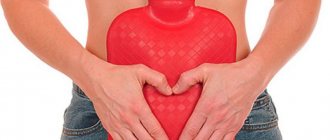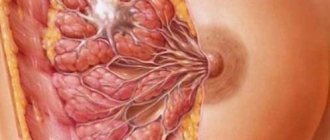Hot flashes during menopause are so common that this symptom has become a hallmark of the menopausal period. Such changes in the body cause a woman a lot of discomfort and can significantly reduce her quality of life. To reduce the manifestation of unpleasant symptoms, it is necessary to understand the mechanism of activation of hot flashes, the reason for their occurrence and determine effective methods of combating ailments during menopause.
Features of menopausal age
Hot flashes are one of the first signs of menopause. They can occur approximately 2 years before the onset of serious menopausal changes.
The average age of onset of menopause is 45–50 years, but there are early menopause (at 40 years or earlier), and later menopause, which lasts up to 60 years and longer. Hot flashes occur at approximately 45–50 years of age and last from 2 to 5 years, with the exception of cases when hot flashes have been bothering a woman for more than ten years.
Such symptoms are closely related to hormonal changes caused by the onset of menopause. Menopause itself is divided into 3 stages:
- Premenopause is a period of gradual decline of ovarian function and decreased production of sex hormones.
- Menopause is the cessation of reproductive function in the female body, diagnosed by the minimum level of estrogen in the blood and the absence of menstruation for more than a year. Menstruation stops completely during menopause.
- Postmenopause is a long non-fertile period in the life of a mature woman.
The most pronounced manifestations of menopause are in the middle of premenopause, when estrogen levels have already noticeably decreased, but the body has not yet had time to adapt to the changes. Typically, hot flashes in women go away on their own after 50, as the body adapts to new hormonal conditions. However, this takes from two to ten years. And sometimes hot flashes continue even in postmenopause. Therefore, identifying anxiety symptoms and ways to get rid of them are more relevant than ever. To figure out how to cure the unpleasant symptoms of menopause, you need to understand which of them are signs of hot flashes, as well as find out why they occur and what they mean.
Pathophysiology and signs of hot flashes
So what are hot flashes during menopause and how to detect them? Hot flashes are a stress reaction of the hypothalamus and vegetative-vascular system to disturbances in body thermoregulation caused by hormonal imbalance.
The pathophysiology of this condition has not been fully studied by doctors, but numerous studies show that the main source of poor health is the central nervous system (CNS) and the main regulator of thermoregulation - the hypothalamus.
The disruption occurs in the endocrine chain pituitary gland-hypothalamus-ovaries.
With age, the ovaries run out of follicles suitable for egg maturation, and as a result of this process, estrogen production decreases, but the pituitary gland continues to actively produce follicle-stimulating and luteinizing hormones for some time.
The hypothalamus stimulates the pituitary gland and secretes these hormones in the body. An imbalance of sex hormones causes an adaptive response in the brain. Thermoregulation neurons located in the hypothalamus also react. This is the main reason why women feel hot flashes and sweat during menopause, but this symptom can be caused and aggravated by dysfunctional changes in the thyroid gland, adrenal glands and cardiovascular system.
Before you begin to treat menopausal hot flashes, you should visit a gynecologist-endocrinologist and determine exactly what is causing the discomfort in you specifically.
In connection with the processes described above, menopausal women suffer from causeless hot flashes and abnormal sweating in the upper body, which are often replaced by chills. You can add to these symptoms:
- redness of the face, neck and chest;
- feeling of stuffiness;
- protruding beads of sweat on the forehead, back and armpits;
- tremor of hands and feet;
- anxiety;
- irritability;
- deterioration in general health.
The frequency of attacks varies from 2 to 20 per day, to 1–2 times per month. Hot flashes are felt day and night, and their duration ranges from several minutes to 2 hours.
Manifestations of night hot flashes in women lead to sleep disturbances and aggravate symptoms.
The reaction of the hypothalamus to hormonal imbalance affects not only thermoregulation, but also heart function, the condition of blood vessels, the functioning of the thyroid gland and adrenal glands. Therefore, signs of hot flashes are often accompanied by:
- rapid heartbeat;
- high blood pressure;
- migraines;
- pain in muscles and body.
The degree of manifestation of all of the above symptoms depends on the characteristics of the course of premenopausal syndrome.
The symptoms of hot flashes manifest themselves in different ways depending on your health, genetics and lifestyle. Women who experience stress in the family or at work or who have bad habits are more likely to experience more severe malaise.
Sweating and heat during menopause can also increase:
- environmental factors;
- poor nutrition;
- the presence of chronic and endocrine diseases;
- cases when the thyroid gland is removed;
- taking medications.
If the symptoms described above are your case, you should not delay visiting a doctor and wait for the ailment to go away on its own. Modern medicine offers effective methods for eliminating unpleasant symptoms and alleviating menopause. Hot flashes in women can impair quality of life for many years. But this is an optional condition of the menopausal period. Using qualified help, you will be able to return bright colors to your life.
Symptoms
The duration of the period when heat attacks occur depends on the individual characteristics of the body. For some, symptoms appear within six months, for others they last for years.
The symptoms and their intensity also vary. The first manifestations can occur some time before the onset of menopause and last for some time after the cessation of menstruation.
Most often, an attack lasts from a few seconds to three minutes. It has been noticed that hot flashes appear more often in the evening or at night. In severe cases, the attack can last up to an hour.
Characteristic symptoms:
- a premonition that a fever attack is about to occur and anxiety as a result;
- feeling of heat in the upper half of the body;
- sudden rush of blood to the face;
- arrhythmia and dizziness;
- feeling of lack of air;
- nausea and vomiting;
- increased body temperature;
- intense sweating;
- chills after the attack ends.
Natural methods to combat hot flashes
In cases where hot flashes, sweating and other symptoms of menopause are not very intense and occur rarely, changes in lifestyle will help reduce unpleasant symptoms.
First of all, pay attention to the features of your diet. What we eat affects not only the condition of human organs, but can also have a strong impact on hormonal levels:
- Try to minimize the amount of sugar, fast carbohydrates, fried and salty foods you consume. There is no need to exhaust yourself with strict diets, this can greatly affect your hormonal levels.
- Monitor the composition, quality of the diet and methods of preparing dishes.
- Choose foods with a low glycemic index - they reduce dangerous blood sugar levels and insulin resistance.
- Determine how much water you need to drink and do not neglect this habit.
- Eat more plant foods.
- Watch the amount of fructose you consume with fruit - its excess is no less harmful than excess glucose.
- From time to time, treat yourself to your favorite dishes and sweets, even if they do not correspond to the canons of proper nutrition. Joy hormones are your friends.
It is also worth taking tests to determine vitamin deficiency. It can be difficult to provide sufficient levels of beneficial microelements with food alone. This is especially true for residents of large cities who eat exclusively from the supermarket. Contact your gynecologist or nutritionist for advice on which dietary supplements or vitamins would be beneficial for you to take during menopause.
The next source of good mood and regulator of well-being is physical activity. If you haven’t been involved in fitness or other sports before, menopause is the time to start. Join a gym or do exercises at home. Fitness, Pilates, running, yoga or breathing exercises, all of them strengthen not only the body, but also the central nervous system, and therefore can help cope with the symptoms of menopause. Choose what you like, and a slim body and good mood will be a pleasant bonus. Just avoid heavy loads; exercise should bring joy and not tire you.
Review your schedule. If you're overwhelmed at work and catastrophically busy at home, you definitely won't have time for proper nutrition and exercise. Also, a busy schedule is a source of endless stress.
During menopause, your body is especially vulnerable to psychological problems. As you know, the hormonal system is directly related to anxiety and depressive disorders, and therefore, in order not to aggravate already unpleasant symptoms, you should consider your priorities.
Take help from family and friends. If possible, give up unnecessary responsibilities at work. You can devote your free time to your significant other or your favorite hobby. The strategy for any method of treating hot flashes during menopause begins with getting rid of stress and constant fatigue.
Pay attention to your wardrobe. Tight and synthetic clothes only aggravate sweating during menopause. In such clothes, women experience even stronger psychological discomfort, since traces of sweat appear on the fabric and an unpleasant odor may appear. Reconsider your tastes in clothing, choose looser styles made from natural and lightweight fabrics. This simple technique significantly alleviates the symptoms of hot flashes.
Take care of yourself. This has nothing to do with hot flashes, but it will definitely improve your mood. Remember that fading reproductive function negatively affects the condition of the skin and hair. Visit a cosmetologist and with his help select the latest care products. Although menopause is commonly viewed as irreversible aging, it is not. After menopause, a new period of your life begins, you have become more mature and this is an excellent reason to remain beautiful and healthy.
Self-care will not have a hormonal effect, but it helps to gain self-confidence and remove the negative psychological consequences of menopause.
By making lifestyle changes, you will feel better emotionally and physically.
What it is
Hot flashes during menopause, what they are is a frequently asked question. This is a condition of rolling hot attacks in women during menopause.
The hypothalamus has a thermoregulatory center, which is responsible for the distribution of thermal energy in the body. An insufficient amount produced by the body affects the overall hormonal levels, which is perceived as a pathology. As a result, the reflex is triggered and a thermal impulse is issued, which sends a wave of heat throughout the body.
Next comes the response of all systems and organs to the heat surge:
- increased sweating;
- redness of the skin due to a sharp dilation of blood vessels;
- arrhythmia;
- increased anxiety;
- chills.
In some cases, a woman’s body copes with hormonal changes on its own and after some time the thermal processes stabilize, the condition and well-being return to normal.
The intensity of hot flashes varies from person to person. Some ladies do not experience such symptoms of menopause, while others, on the contrary, have a hard time tolerating them. But in any case, everyone at the onset of perimenopause should be prepared for its severe manifestations, try to avoid panic and know how to get rid of hot flashes during menopause.
How to eliminate hot flashes
Situations when a woman is thrown either hot or cold for no reason, causing her to sweat, feel stuffy and irritated, greatly affect the psycho-emotional state and turn menopause into a complete nightmare. The question itself arises: what to drink during menopause in order not to sweat and rid yourself of hot flashes of stifling heat?
The bad news is that if you blindly search for answers on the Internet, miracles will not happen. Many women who have self-treated for hot flashes note that most advertised remedies help relieve symptoms only for the first time. As a result, they become hostages of searching for increasingly stronger drugs until the situation forces them to see a doctor.
The good news is that there is a short and sweet way to solve the problem. Start by visiting a gynecologist as soon as the first signs of menopause appear. During menopause, very complex changes occur in your body, which, divided and multiplied by lifestyle and genetics, can pose a danger to your health. For this reason, it is worth visiting a gynecologist several times more often than during reproductive age. A specialist will help you determine what is happening to you, what the severity of the menopausal syndrome is, and most importantly, he will offer effective and modern treatment methods.
Below we will look at what medications your doctor can recommend for hot flashes. However, remember that you should not self-medicate and prescribe yourself certain medications for hot flashes.
The determining factor in the choice of treatment will be the results of a gynecological examination, ultrasound and hormonal tests. The presence of chronic and hereditary diseases in the patient’s history will also be important.
Hormones for hot flashes
The first thing you may be asked to take during menopause for hot flashes will be hormonal medications. Hormonal tablets for hot flashes are made on the basis of synthetic analogues of estrogen and progesterone in low dosages.
Medicines help maintain hormonal balance, and therefore eliminate the unpleasant reaction of the hypothalamus and relieve hot flashes. Hormones can ease menopause and delay the decline of the reproductive system. This treatment is especially relevant for acute menopausal syndrome, when it is impossible to alleviate a woman’s well-being using home methods.
Before you start taking hormones, you must remember that there is a considerable risk of side effects of this therapy: appetite disturbances, insomnia, swelling of the face and limbs, painful sensitivity of the mammary glands and even weight gain. It is important to consult a gynecologist and find out how to avoid side effects.
Contraindications for taking hormones are:
- renal failure;
- liver pathologies;
- cancerous tumors.
Also, doctors must take into account the presence of cancer in the family history, since there is a risk of pathology occurring while taking hormonal medications.
Non-hormonal therapy
If attempting hormonal therapy during menopause is contraindicated for you, it is worth considering non-hormonal treatment options for hot flashes.
Non-hormonal methods of treating menopause and its manifestations are divided into two types of drugs:
- Means for restoring thermoregulation based on beta-alanine.
- Herbal medicines (phytoestrogens and therapeutic homeopathy).
Antimenopausal drugs can have various forms of release - tablets, capsules, drops, injection solutions. For the tablet form of release, the dosage varies from 1 to 4 tablets 1-3 times a day as prescribed by a doctor. Courses of taking pills and injections last from 3 to 6 months.
Unlike hormonal remedies, the effect of herbal medicine will have to wait longer, and while getting used to the homeopathic components, the symptoms may intensify slightly. Also, a significant disadvantage of phytosubstances is a certain risk of allergic reactions to plant components.
The natural composition does not mean that these medications can be taken without a doctor’s prescription.
Beta-alanine
For women who are contraindicated for hormonal therapy, but suffer from severe malaise, they offer a course of treatment aimed at restoring the function of thermoregulation. This effect is achieved thanks to the amino acid beta-alanine. The substance has an effect on neurotransmitters of the spinal cord and brain, and is also able to regulate the functioning of the muscular layer of blood vessels and thermoregulation functions. The drug is available in the form of capsules and tablets for menopause from hot flashes.
Studies have found that beta-alanine has a positive effect on menopausal symptoms and relieves vasomotor symptoms. Non-hormonal medicine is successfully used in recovery after treatment for oncology of the reproductive organs.
During studies of the use of beta-alanines to reduce the severity of menopausal symptoms, no adverse reactions were found.
Heat during menopause: how to get rid of it
Folk remedies
Before turning to medications that are not always safe, you should try to get rid of the fever using folk remedies, such as:
- Sage tea. You need to pour 1 tsp of boiling water. herbs and let it brew. For 2 weeks you should replace regular tea with sage tea.
- Soothing tea. You will need to mix 2 tbsp. l. chamomile and 1 tbsp. l. valerian and mint. From the resulting assorted herbs you need to take 2 tbsp. l. and pour 0.5 liters of boiling water over them. After 3 hours, the infusion should be strained. You need to treat yourself to a drink 20 minutes in advance. before meals.
- Pollen. You need to enjoy it within 15 minutes. before breakfast. The portion should not be large: 1 tsp is enough.
- Beetroot juice. You need to squeeze the juice out of one fresh root vegetable. Then mix it half and half with honey. Drink 0.3 cups three times a day. The drink relieves irritability, thereby reducing the number of stressful situations and, as a result, reducing the likelihood of hot flashes.
- Valerian infusion. Pour a small amount of boiling water over 1 tbsp. l. crushed valerian roots and let them brew for 7-9 hours. You need to drink the infusion three times a day, 1 tbsp. l.
- White willow bark tea. It is important that the bark is collected in early spring, before the first leaves appear. However, in modern realities it can simply be purchased at a pharmacy. You need to pour 2 tbsp into boiling water. l. finely chopped bark and cook over low heat for 10 minutes. Let the broth brew for 5-7 minutes. and strain. The drink should be consumed warm 5 times a day.
- Flax seeds. They can be consumed both in the form of oil and in the form of seeds. They significantly reduce the severity of the “hot” symptoms of menopause.
- Simple moves. They will help to quickly stop the onset of heat. At the first symptoms of an approaching tide, you need to raise your arms and place your feet in a basin of hot water.
Many women manage to improve their well-being by following folk recipes. But if discomfort continues to accompany the menopause, you should consult a doctor to prescribe medication.











